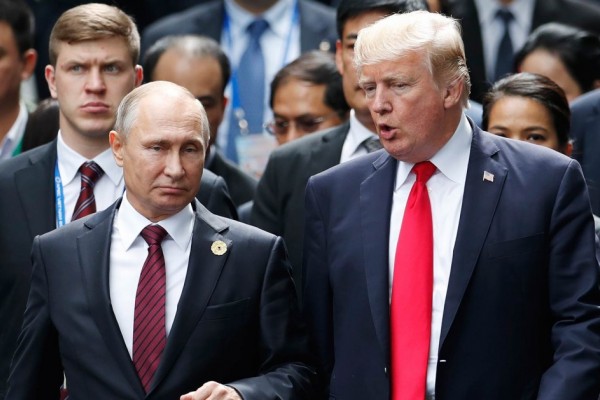When it comes to election interference, the problem isn’t just Russia
Claims of foreign interference in our elections are far from innocent

Russian traditional nesting dolls with portraits of Vladimir Putin and Donald Trump. Photo from Flickr.
Yevgeny Prigozhin, the Russian oligarch, long-time friend of Vladimir Putin, and founder of the Wagner mercenary group, recently admitted that he had a hand in interfering in US elections. “Gentlemen, we interfered, we are interfering and we will interfere,” Prigozhin wrote in what must have been the strangest catering company memo ever penned (it was posted by his company, Concord, which provides food services to the Kremlin). The mainstream media was quick to jump on this ‘aha moment,’ with few questioning the legitimacy of Prigozhin’s statements—is he telling the truth, or is he just a swaggering billionaire strongman? Given that he is one of many Russian oligarchs to have been sanctioned by the US, who’s to say he’s not just bitter about it? Some may counter that Prigozhin was among 13 Russian nationals named in the indictment by a federal grand jury for interfering in the 2016 American election, making the admission seem more credible. The real question, however, is should we care?
Media outlets have poured countless hours into proving the extent of Russian election interference with barely a shred of critical thought. Time magazine, in an article so breathlessly covering the severity of the matter it’s practically wheezing, reveals that about $46,000 was spent on Russian-linked Facebook ads in the leadup to the election, “compared to the $81 million the Trump and Clinton campaigns spent on the platform combined.”
In spite of the paltry spending, analysts found that these posts had a much larger reach than anything the mainstream parties were putting out. Why was that? The Time article doesn’t really provide a reason for it, but when looking at the sorts of topics suggested in the indictment it shouldn’t be hard to figure out why—issues like immigration, race, and the “urban-rural divide” were not ones the Russians made out of whole cloth; they were divisions which had long been present in American life. Indeed, Americans already believed a lot of what the Russians posted, wrong or otherwise.
Still, there were accusations in major “papers of record” as recent as the George Floyd protests which suggested that Black Lives Matter was a Russian op and that Russians were targeting African-Americans to stoke racial tensions. It’s not as though it was all based in “misinformation”—it was rooted in resentment of real systemic issues which had been festering for generations. Elsewhere, The Atlantic ran an essay on the history of Russian involvement in America’s race wars to draw a direct line from propaganda posters mocking the injustices of the Jim Crow South to Facebook ads zeroing-in on divisive contemporary issues—”just another page from the old Soviet handbook.”
Little attention is paid, comparatively, to much larger foreign movers and shakers in American political life. In 2018 alone, Israeli lobbyists spent at least $22 million on lobbying and campaign donations during the 2018 election cycle (this is called “legitimate political contributions”). Saudi Arabia, meanwhile, was meddling as recently as last week. Where are the anxious reports on “Israelgate” or “Saudigate”? They’re nowhere to be found.
This Time magazine cover from July 15, 1996 details the role of the United States in helping to rig the Russian presidential election that year.
While all of these matters should be of interest to the American public, none get so much as a mainstream whimper when compared to Russiagate, a deliberate obfuscation tactic. Canada is no stranger to this phenomenon—while our media is quick to pipe up about Chinese interference in domestic politics, even going so far as to suggest some Canadian MP hopefuls might be literal Manchurian candidates, the same media stays relatively hush about its own meddling in the Global South.
The purpose of this rhetoric is threefold. It distracts the populace from ongoing matters which bear actual relevance to their lives; it stokes a paranoia that dismisses critical statements as enemy propaganda; and it manufactures consent for conflicts with our geopolitical foes.
There’s a reason the focus is on Russia and China and not on Israel or Saudi Arabia, because the latter two countries are our geopolitical allies, and so there’s no need to call them into question, lest the public demand we do something about it. Don’t allow yourself to be distracted by these ostensible canards, and don’t be afraid to resort to a little “whataboutism,” a necessary tactic for pointing out the hypocrisy of curated disproportionate attention. Claims of foreign interference in our elections are far from innocent. They are attempts to influence our own political positions.
Jack Daniel Christie is a writer, artist, and law student of Anishinaabe descent, splitting his time between Toronto and Montréal. His poetry has appeared in Soliloquies, Headlight Anthology, and Bad Nudes.










